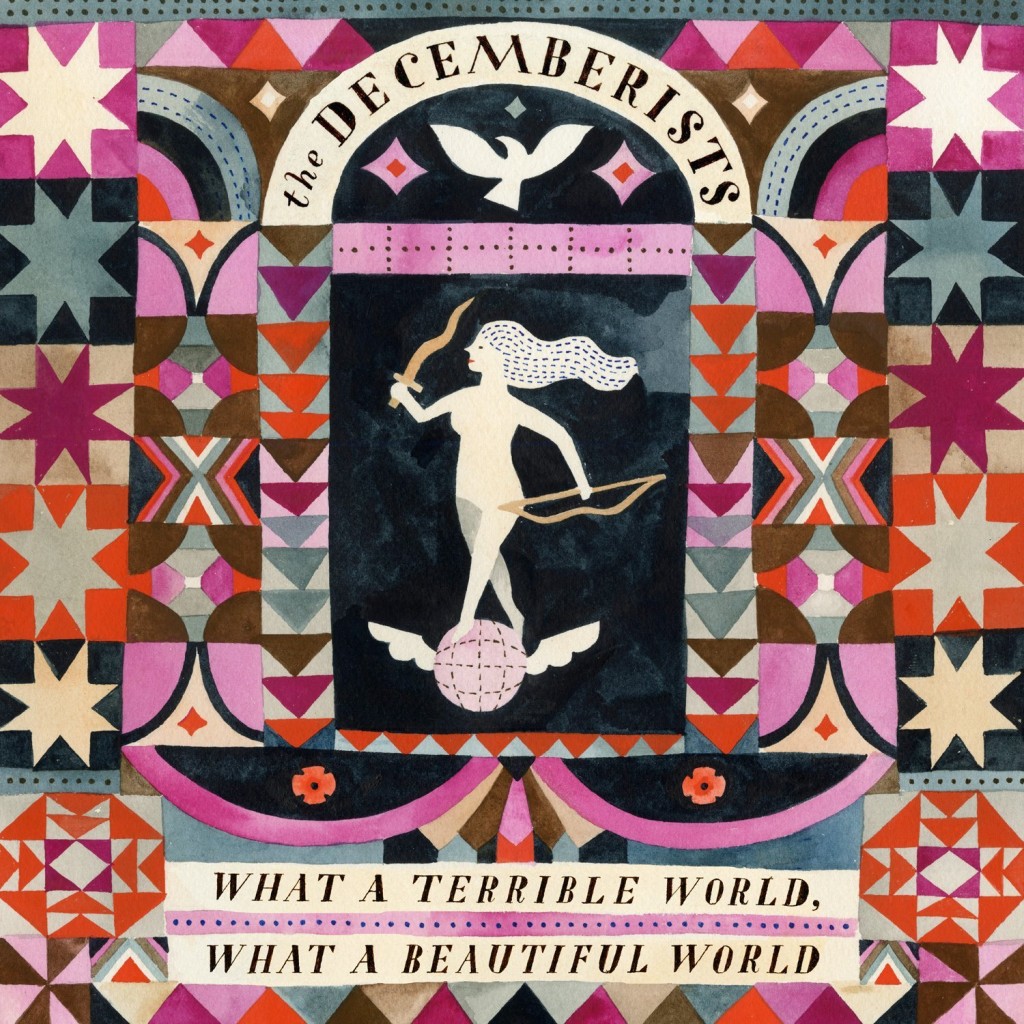Folk-rock icons The Decemberists have a well-earned reputation for melancholy. They’re best known for their musical brand of Dickensian tragedy, The Smiths by way of Fairport Convention. The short stories found on a Decemberists album frequently involve murder, rape, revenge, war, ghosts, and the occasional suicide pact, all performed with a quirky, over-the-top theatricality. They drop a tear from one eye and wink with the other. But their last album, 2011’s The King Is Dead, strayed from the Elizabethan They Might Be Giants shtick, delivering a genuinely uplifting hour of Americana. While The King is Dead still featured two songs about soldiering, and a detailed, dreamed apocalypse in which “scores of innocents died,” the sense of life and rebirth greatly outweighed that of death. Four years later, we’re treated to What a Terrible World, What a Beautiful World, and while it doesn’t abandon melancholy altogether, it stands as the band’s most honest and least stylized collection of song-stories, continuing their move away from tales of bloodied faces and broken hearts.
What a Terrible World is, in part, a commentary on how much the band has changed since their first album, Castaways and Cutouts, was released in 2002. The opening track, “The Singer Addresses His Audience,” is sung from the first-person perspective of the leader of a Very Important Band, explaining the toll that fame has taken on their lives, and kinda-sorta-not really apologizing for the way that “though [they] tried, [they] had to change some.” Decemberists singer and sole songwriter Colin Meloy has not, and likely never will, reach the level of fame at which “[his] bridal processional is a televised confessional to the benefit of Axe shampoo,” but this hyperbolic example rings true to the fact that it’s impossible for an artist not to be influenced by the exposure, the criticism, and most of all, the repetition that comes with being a successful performer.
In the case of Meloy, the personal transformation that has come with his success is plainly a positive one. The music of the Decemberists has never been more genuinely happy, focusing more on pastoral scenes of home and family than smoke-choked streets populated by the miserable and downtrodden. Meloy no longer needs to prove, as so many “hipster” artists do, that he’s above sentiment, no longer needs to punish the characters in his songs who dare to reach after a love or a dream. He no longer submits to the idea that a story needs a tragic or ironic ending to be worth telling.
This is the main thrust of “Anti-Summersong,” in which Meloy flatly admits that he’s done writing “sing-along suicide songs.” The title and chorus refer to “Summersong,” off of The Decemberists’ acclaimed The Crane Wife, which is one of many, many of their songs in which someone drowns. Meloy, like the voice in “The Singer Addresses His Audience,” knows what’s expected of him and isn’t afraid to confound those expectations and contradict everything that’s said about him on the band’s TV Tropes page.
What a Terrible World… is The Decemberists’ most clear statement so far that they’re capable of doing more than one thing at a time, and eager to do so. The new album has a wider range of musical styles and emotions than any of their previous work. Some tracks, like “Make You Better” or “The Wrong Year,” feel closely related to The King is Dead‘s radio-friendly Americana, while “Lake Song” and “Better Not Wake the Baby” evoke their more dreary, British Trad-inspired early work, all the way back to Her Majesty The Decemberists. There are dark, creepy moments on this album, but they’re not performed with a wink; even the menace is more genuine than it’s been in the past.
Then there’s the standout “Philomena,” a coming-of-age love/sex ballad whose sugar-sweet melody and twee production are reminiscent of a She & Him track. Sonically, it’s further into the land of twee than The Decemberists have ever dared to venture, but lyrically it is pure Meloy, flowery and unstuck in time, perfectly straddling cute and creepy. (The track wasn’t available to embed at the time of publication, but we’ll add one as soon as the album hits Spotify.)
On the other side of the spectrum, there’s the somber and meditative “12-17-12,” a slow ballad punctuated with harmonica. “12-17-12” is an ode from a (presumably) new father to a mother-to-be, quietly celebrating their new family despite the suffering in the world. The title refers to the day that the first victims of the school shooting in Newtown, Connecticut were buried. “What a gift, what a gift you’ve been giving me / here with my heart so whole while others may be grieving,” sings Meloy, and while previous Decemberists efforts have been about finding humor in tragedy, this song holds the more poignant message that the darkest moments can also be the ones that remind you of the goodness of life. It’s from this song that the album takes its title, What a Terrible World, What a Beautiful World, and the song’s placement near the end of the album helps to put the rest of the emotionally uneven album in context.
While it’s not as consistently memorable as their last four near-perfect albums, What a Terrible World, What a Beautiful World benefits from variety, from honesty, from the clear emotional growth of its architect. The Decemberists will likely never give us another Picaresque, and that’s okay. Their latest album proves that there is still new territory to explore within and without The Decemberists’ distinctive idiom.
What a Terrible World, What a Beautiful World drops in stores on Tuesday.


